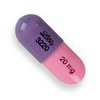 | Arimidex Active Ingredient: Anastrozole Arimidex is used for treating breast cancer in women who have been through menopause, including women with disease progression after tamoxifen therapy. |
| Package | Per Pill | Price | Savings | Bonus | Order |
|---|---|---|---|---|---|
| 1mg × 30 pills | $6.86 | $205.92 | + Ed trial pack 3 | ||
| 1mg × 60 pills | $5.49 | $329.47 | $82.37 | + Viagra |
INDICATIONS
Arimidex is used for treating breast cancer in women who have been through menopause, including women with disease progression after tamoxifen therapy. Arimidex is an aromatase inhibitor. It works by lowering blood estradiol concentrations, which may decrease the size and growth of the tumor.
INSTRUCTIONS
Use Arimidex as directed by your doctor.
- Take Arimidex by mouth with or without food.
- If you miss a dose of Arimidex, take it as soon as possible. If it is almost time for your next dose, skip the missed dose and go back to your regular dosing schedule. Do not take 2 doses at once. If more than one dose is missed, contact your doctor or pharmacist.
Ask your health care provider any questions you may have about how to use Arimidex.
STORAGE
Store Arimidex at room temperature, between 68 and 77 degrees F (20 and 25 degrees C) in a tightly closed container. Store away from heat, moisture, and light. Do not store in the bathroom. Keep Arimidex out of the reach of children and away from pets.
MORE INFO:Active Ingredient: Anastrozole.
Do NOT use Arimidex if:
- you are allergic to any ingredient in Arimidex
- you have not gone through menopause
- you are pregnant
- you are taking estrogen (eg, birth control pills, hormone replacement therapy) or tamoxifen.
Contact your doctor or health care provider right away if any of these apply to you.
Some medical conditions may interact with Arimidex. Tell your doctor or pharmacist if you have any medical conditions, especially if any of the following apply to you:
- if you are pregnant, planning to become pregnant, or are breast-feeding
- if you are taking any prescription or nonprescription medicine, herbal preparation, or dietary supplement
- if you have allergies to medicines, foods, or other substances
- if you have liver problems, osteoporosis (weak bones), heart problems, or high cholesterol or lipid levels.
Some medicines may interact with Arimidex. Tell your health care provider if you are taking any other medicines, especially any of the following:
- Estrogen (eg, birth control pills, hormone replacement therapy) or tamoxifen because they may decrease Arimidex's effectiveness.
This may not be a complete list of all interactions that may occur. Ask your health care provider if Arimidex may interact with other medicines that you take. Check with your health care provider before you start, stop, or change the dose of any medicine.
Important safety information:
- Arimidex may cause dizziness. This effect may be worse if you take it with alcohol or certain medicines. Use Arimidex with caution. Do not drive or perform other possible unsafe tasks until you know how you react to it.
- Lab tests, including blood cholesterol or bone mineral density, may be performed while you use Arimidex. These tests may be used to monitor your condition or check for side effects. Be sure to keep all doctor and lab appointments.
- Arimidex should be used with extreme caution in children; safety and effectiveness in children have not been confirmed.
- Pregnancy and breast-feeding: Arimidex has been shown to cause harm to the fetus. If you think you may be pregnant, contact your doctor. You will need to discuss the benefits and risks of using Arimidex while you are pregnant. It is not known if Arimidex is found in breast milk. If you are or will be breast-feeding while you use Arimidex, check with your doctor. Discuss any possible risks to your baby.
All medicines may cause side effects, but many people have no, or minor, side effects.
Check with your doctor if any of these most common side effects persist or become bothersome:
Anxiety; back, bone, breast, joint, or pelvic pain; constipation; cough; diarrhea; dizziness; flu-like symptoms (eg, muscle aches, tiredness); headache; hot flashes; loss of appetite; nausea; sore throat; stomach pain or upset; sweating; tingling or burning sensation; trouble sleeping; vaginal dryness; vomiting; weakness; weight gain.
Seek medical attention right away if any of these severe side effects occur:Severe allergic reactions (rash; hives; itching; difficulty breathing or swallowing; tightness in the chest; swelling of the mouth, face, lips, or tongue; unusual hoarseness); calf pain, swelling, or tenderness; chest pain; dark urine; depression; fainting; fever, chills, or persistent sore throat; frequent or painful urination; mental or mood changes; numbness of an arm or leg; one-sided weakness; red, swollen, blistered, or peeling skin; severe or persistent bone pain; severe or persistent dizziness or headache; severe or persistent nausea, vomiting, or stomach pain; severe or persistent tiredness or weakness; shortness of breath; speech problems; sudden, severe headache; swelling of the arms or legs; swollen lymph nodes; vaginal bleeding or unusual discharge; vision changes; yellowing of the skin or eyes.
This is not a complete list of all side effects that may occur. If you have questions about side effects, contact your health care provider.
 BestinaBestina Capsule helps the needs of women who are not happy with the size or appearance of their breasts.as low as $26.82
BestinaBestina Capsule helps the needs of women who are not happy with the size or appearance of their breasts.as low as $26.82 SarafemSarafem is used for treating premenstrual dysphoric disorder (PMDD), a severe form of premenstrual syndrome.as low as $0.61
SarafemSarafem is used for treating premenstrual dysphoric disorder (PMDD), a severe form of premenstrual syndrome.as low as $0.61 SeropheneSerophene (Clomiphene) is used for treating female infertility.as low as $0.5
SeropheneSerophene (Clomiphene) is used for treating female infertility.as low as $0.5 ClomidClomid is used for treating female infertility.as low as $0.49
ClomidClomid is used for treating female infertility.as low as $0.49 Flagyl ERFlagyl ER is used for treating certain bacterial infections of the vagina (bacterial vaginosis).as low as $0.29
Flagyl ERFlagyl ER is used for treating certain bacterial infections of the vagina (bacterial vaginosis).as low as $0.29 EstraceEstrace is used for treating conditions due to menopause (eg, hot flashes; vaginal itching, burning, or dryness), treating vulval or vaginal atrophy, and preventing osteoporosis (brittle bones).as low as $0.8
EstraceEstrace is used for treating conditions due to menopause (eg, hot flashes; vaginal itching, burning, or dryness), treating vulval or vaginal atrophy, and preventing osteoporosis (brittle bones).as low as $0.8